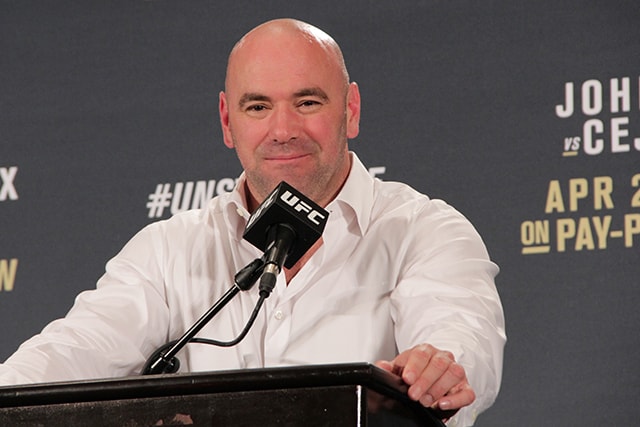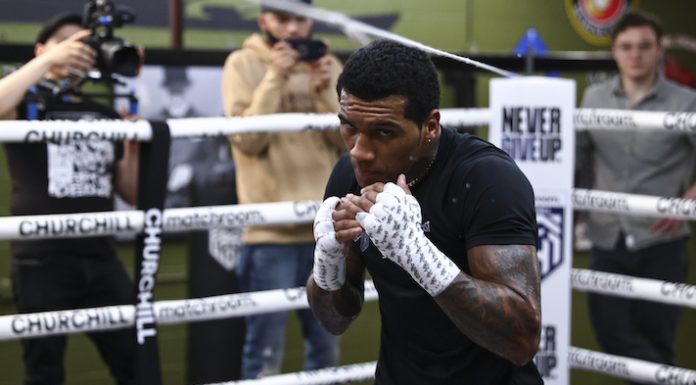
Just because they can, doesn’t mean they will: there are a myriad of reasons the UFC won’t switch to a WWE Network style solution any time soon.
UFC parent company WME-IMG’s purchase of streaming provider NeuLion has once again fanned the flames of an all-digital dream. The reason for this is simple: UFC Pay-Per-Views are a prohibitive cost for many North American MMA fans. With roughly fourteen events costing around $60 U.S. each year, the numbers add up. Fans are already hip to the fact that even within PPV cards, there’s a class system, and many tune the lower class cards out.
Yet even the most casual of fan might be tempted to subscribe to a streaming service offering everything for a reasonable price. That’s the dream. The NeuLion purchase once again has it on the tip of everyone’s tongue.
Which is fine. Just don’t hold your breath.
The reasoning is simple: Yes, NeuLion has at times been the UFC’s streaming provider. They were infamously thrown under the bus when the MayMac stream bombed for many paying customers last August, leading to a brief flirtation between the UFC and Fite.tv, but that seemed to last all of half a minute. In general, NeuLion has performed well, and powers both the NFL and NBA as well as select UFC events. It’s not the only game in town, and the NHL switching providers dealt it a blow in recent years, but it’s a player.
Thus when a purchase like the WME acquisition of NeuLion is witnessed, much is read into the situation. “The UFC is going to launch its own version of the Network!” is the most common refrain. That all stems from the success of the WWE Network.
Yet the comparison between the MMA juggernaut and pro-wrestling powerhouse is apples to oranges. And while yes, there is crossover between their respective audiences, there’s little to suggest that the UFC will be able to replicate the WWE’s success.
First, lets stop pretending that the WWE Network gives subscribers everything. Simply put, it does not. The WWE continues to have a lucrative multi-national TV deal (more accurately, deals) for both RAW, Smackdown, and ancillary programming. How lucrative? With its U.S. TV deal with USA Network expiring, WWE has been in talks with FOX — home, of course, of the UFC. Add Canada, and other nations, and you see the value of keeping the WWE’s flagship shows on TV. RAW and Smackdown aren’t about to become WWE Network exclusives. There’s way too much money at stake.
WME-IMG, meanwhile, were looking to push the broadcasting rights of the UFC up towards the $450 million annual mark. The current deal is valued somewhere in the range of $120 million per year, but the company was banking on a dearth of sports-related content coming available over the next few years, at a time when live sports is the last remaining draw traditional television has to offer.
Only, a few things were not factored in: a slump in interest in the brand thanks to stars like Ronda Rousey and Conor McGregor going AWOL, and the WWE competing for the same airtime. That’s right: the WWE have been talking to FOX, among other networks. And there probably won’t be room for both promotions on a single network, regardless of the fact that one is a sport while the other is scripted.
With FOX reportedly low-balling the UFC with an offer in the $200 million range, the network’s exclusive negotiation window with the promotion expired. That saw interest from Amazon, Turner Sports, and others begin to ramp up. Yet at the same time, UFC ratings are flagging.
So again, the refrain becomes “Network” — only, it’s not an optimal solution for the UFC currently. The WWE retains its television deal, and the UFC would need to as well, in some form. Were the UFC to eliminate PPVs, they would still need some sort of TV deal, at least in the short term. And were they to scrap the TV deal, move free FOX cards to a streaming service, and keep PPVs around — well that might do more harm than good, since previously free cards (or at least free with cable, in most cases) would suddenly require a subscription.
Is Joe Six Pack signing up for UFC Fight Pass to get something he watched free on FOX last month?
It’s hard, as a fan of the sport and the promotion, not to want all content in one place. Lets shatter that illusion in the WWE comparison also, however. WWE Network doesn’t offer everything in one spot: RAW and Smackdown air elsewhere. And internationally, the WWE Network is not universal. Take Canada, for instance. There, the Network is an actual cable TV channel, with some supporting On Demand content. It’s nowhere near as robust as it’s U.S. counterpart, leading some Canadian WWE fans to subscribe to the U.S. Network on the sly.
How WME-IMG/UFC would deal with the international puzzle is another question. Territories like the U.K. and Brazil already have TV deals for PPV shows, meaning they’re not dropping nearly as much money on the UFC’s product as their North American counterparts. That’s something that needs to be factored into the equation as well. You put everything on Fight Pass, or even just PPV shows, well, you’re not getting an influx of subscribers from areas that don’t use PPV anyway.
Then there’s the UFC desire to be recognized as the premiere league of a sport with global appeal. Remember all those soccer and NFL comparisons Dana White and co. used to make? Their yearning to be featured on ESPN and its ilk was transparent, and justifiably so. Yet were the UFC to move to a streaming-only solution, is it not admitting that ultimately, “ultimate” fighting is just a niche sport?
Dig a little deeper, and you find the other advantage WWE has when it comes to making the Network work: star power. WWE is in the star building business, something much easier to do when the outcomes are scripted. The UFC has no such luxury. WWE Network can get away with campy shows like Holy Foley and The Edge & Christian Show That Totally Reeks of Awesomeness — the UFC simply can’t. And there’s only so many times Dana White can go Lookin’ for a Fight or host a Contender Series.
There’s another star power issue to contend with as well: longevity. What’s the shelf life of a star in MMA? Five years? Ten? In the NHL, or NBA, stars like Gretzky, Lemieux, Crosby, or Jordan, Johnson, and LeBron tend to rule for upwards of a decade. Entire generations grow up worshiping the same superstars. WWE can make that last even longer, when you consider the run of someone like The Undertaker. They can put the same stars on TV, week after week, and if someone falls due to injury or retirement, another can immediately step in.
In MMA, a knockout or two, and you could be out of the sport. Ronda Rousey’s entire MMA career as a professional lasted five and a half years. Less than six years! The UFC portion of that was under four years! The turnover rate in the promotion is so high, and losses do so much damage to top stars, that keeping anyone in the spotlight for an extended period of time is nearly impossible. Of course, that factor impacts both a streaming service and a TV deal, and it a reality the promotion will have to contend with.
In any case, what you’d get on a more robust UFC Fight Pass (assuming they wouldn’t rebrand) would be live events… plus what’s already there. The archive of events, which is quite impressive when you factor in all the promotions the UFC has absorbed over the years. But that’s still little reason to have a “network” style platform.
Now — all this boils down to price point, because were you to offer every UFC event in one place, live, for say, $25 a month, many would likely jump at the offer. Yet many wouldn’t, and WME-IMG is currently trying to recoup a $4.2 billion dollar purchase that had hefty loans attached to it. They’re unlikely to be all that patient with the process. The WWE Network had some scary moments early on as it pushed towards its subscriber goal. For the UFC, well, ownership would no doubt prefer guaranteed money.
So — it probably won’t happen this time around. Some day, the UFC may very well jump entirely to a streaming platform. It may well do so before most of the other major sports. Just don’t hold your breath waiting for it, because the timing simply isn’t right at the moment. After all, timing in MMA is everything.




















